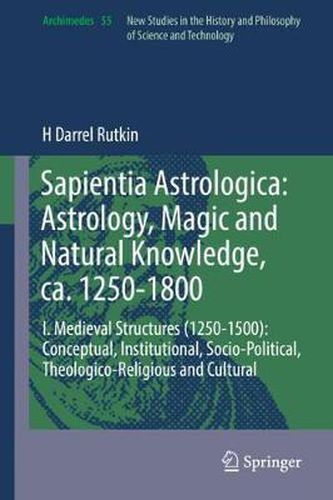Readings Newsletter
Become a Readings Member to make your shopping experience even easier.
Sign in or sign up for free!
You’re not far away from qualifying for FREE standard shipping within Australia
You’ve qualified for FREE standard shipping within Australia
The cart is loading…






This title is printed to order. This book may have been self-published. If so, we cannot guarantee the quality of the content. In the main most books will have gone through the editing process however some may not. We therefore suggest that you be aware of this before ordering this book. If in doubt check either the author or publisher’s details as we are unable to accept any returns unless they are faulty. Please contact us if you have any questions.
This book explores the changing perspective of astrology from the Middle Ages to the Early Modern Era. It introduces a framework for understanding both its former centrality and its later removal from legitimate knowledge and practice. The discussion reconstructs the changing roles of astrology in Western science, theology, and culture from 1250 to 1500.
The author considers both the how and the why. He analyzes and integrates a broad range of sources. This analysis shows that the history of astrology-in particular, the story of the protracted criticism and ultimate removal of astrology from the realm of legitimate knowledge and practice-is crucial for fully understanding the transition from premodern Aristotelian-Ptolemaic natural philosophy to modern Newtonian science.
This removal, the author argues, was neither obvious nor unproblematic. Astrology was not some sort of magical nebulous hodge-podge of beliefs. Rather, astrology emerged in the 13th century as a richly mathematical system that served to integrate astronomy and natural philosophy, precisely the aim of the New Science of the 17th century. As such, it becomes a fundamentally important historical question to determine why this promising astrological synthesis was rejected in favor of a rather different mathematical natural philosophy-and one with a very different causal structure than Aristotle’s.
$9.00 standard shipping within Australia
FREE standard shipping within Australia for orders over $100.00
Express & International shipping calculated at checkout
This title is printed to order. This book may have been self-published. If so, we cannot guarantee the quality of the content. In the main most books will have gone through the editing process however some may not. We therefore suggest that you be aware of this before ordering this book. If in doubt check either the author or publisher’s details as we are unable to accept any returns unless they are faulty. Please contact us if you have any questions.
This book explores the changing perspective of astrology from the Middle Ages to the Early Modern Era. It introduces a framework for understanding both its former centrality and its later removal from legitimate knowledge and practice. The discussion reconstructs the changing roles of astrology in Western science, theology, and culture from 1250 to 1500.
The author considers both the how and the why. He analyzes and integrates a broad range of sources. This analysis shows that the history of astrology-in particular, the story of the protracted criticism and ultimate removal of astrology from the realm of legitimate knowledge and practice-is crucial for fully understanding the transition from premodern Aristotelian-Ptolemaic natural philosophy to modern Newtonian science.
This removal, the author argues, was neither obvious nor unproblematic. Astrology was not some sort of magical nebulous hodge-podge of beliefs. Rather, astrology emerged in the 13th century as a richly mathematical system that served to integrate astronomy and natural philosophy, precisely the aim of the New Science of the 17th century. As such, it becomes a fundamentally important historical question to determine why this promising astrological synthesis was rejected in favor of a rather different mathematical natural philosophy-and one with a very different causal structure than Aristotle’s.